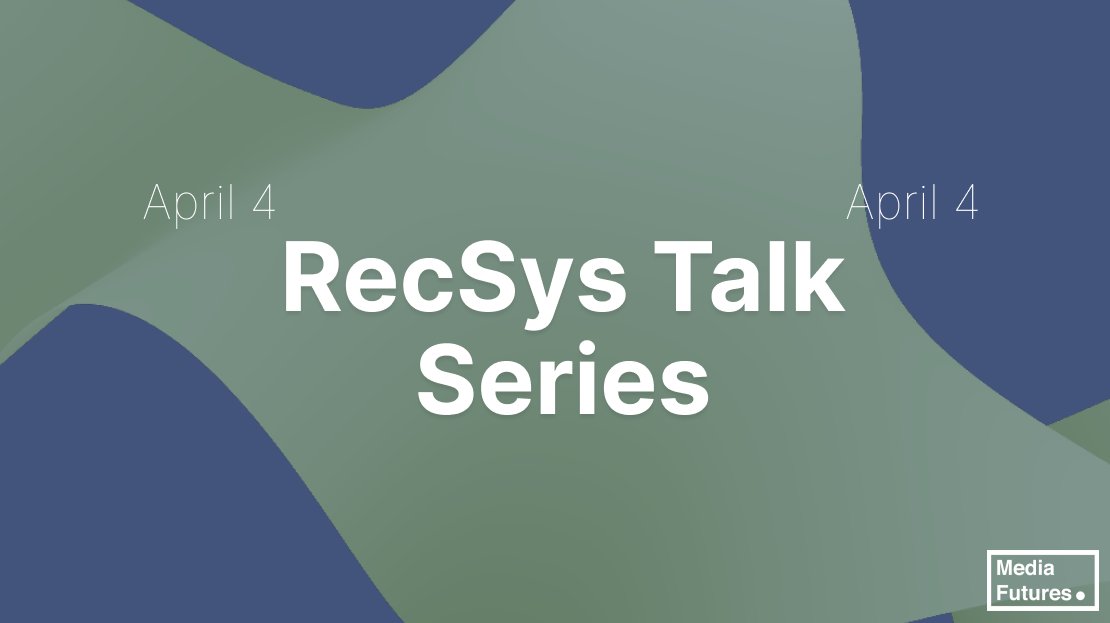
- This event has passed.
Talks on Responsible Recommender Systems

April 4, MediaFutures sets the stage for a joined event featuring a series of talks, including contributions from Sole Pera (TU Delft) and the PhD candidates Lukas Wegmeth and Tobias Vente (University of Siegen).
- 10:45 – 11:45 | Sole Pera on “Into the AI-Known: How Search and Recommender Systems Shape Children’s Online Experiences & the Path to Safer Information Access”
- 12:00 – 13:00 | Lukas Wegmeth & Tobias Vente, “Green Recommender Systems – Minimizing Carbon Footprint for Sustainable Personalization”
Sole Pera, Associate Professor @ Delft University of Technology
Time: 10:45 – 11:45
Title: “Into the AI-Known: How Search and Recommender Systems Shape Children’s Online Experiences & the Path to Safer Information Access”
Abstract: In the AI era, search and recommendation systems increasingly shape how children perceive the world and interact with digital media. However, these systems are seldom designed with young users in mind, leading to exposure to content that is misleading, inappropriate, or simply not aligned with their needs. While AI has the potential to improve online information access, ensuring safe, effective, and age-appropriate digital experiences remains a challenge. In this talk, we will explore how mainstream search and recommendation algorithms influence what children encounter online. Along the way, we review current research, discuss the challenges and opportunities in building safer digital environments, and consider the ethical implications of designing AI-driven information access systems that prioritize children’s rights and well-being.
Dr. Maria Soledad Pera is an Associate Professor at the Web Information Systems group of the Faculty of Electrical Engineering, Mathematics and Computer Science (EWI), Delft University of Technology. Sole’s main area of expertise is in Information Retrieval with emphasis on non-traditional population.
Lukas Wegmeth & Tobias Vente, PhD candidates at University of Siegen
Time: 12:00 – 13:00
Title: “Green Recommender Systems – Minimizing Carbon Footprint for Sustainable Personalization”
Abstract: Did you know one recommender systems research paper emits ~3,300 kgCO₂e — the same as one person flying from New York to Melbourne? This talk unveils the urgent need for Green Recommender Systems and delivers actionable guidelines to achieve them. We quantify the carbon footprint of training and inference, comparing deep learning and traditional algorithms. The goal? High-performance recommender systems that don’t cost the Earth. Discover how to minimize the carbon footprint while maintaining performance through energy-aware design, efficient hardware, and transparent reporting. This is a call to action: by rethinking how we design and measure recommenders, we can pioneer sustainable AI that benefits both users and the planet.
Lukas Wegmeth is a Ph.D. Student of the Intelligent Systems Group at the University of Siegen. Before joining the ISG he completed his bachelor’s and master’s degree in Medical Computer Science at the University of Siegen. During his time as a graduate student, Lukas set his focus on the topic of Machine Learning and collaborated with different chairs of the University of Siegen to work on and release scientific research papers in the field. Lukas is currently analysing recommender systems from an energy efficiency context, measuring amongst other power consumptions.
Tobias is a joint Ph.D. candidate at the ISG – Intelligent Systems Group (University of Siegen) in Siegen, Germany and the ADReM – Adrem Data Lab (University of Antwerp) in Antwerp, Belgium, working on model selection and automation in recommender systems. Generally, his research interests revolve around Recommender Systems, specifically applying ideas from AutoML (Automated Machine Learning) to information retrieval and recommender systems.
To follow the talks online, follow us on zoom:
https://uib.zoom.us/j/65989683261?pwd=DCf1f1O3qFTMoltYavbf9e4h0m8qTy.1
